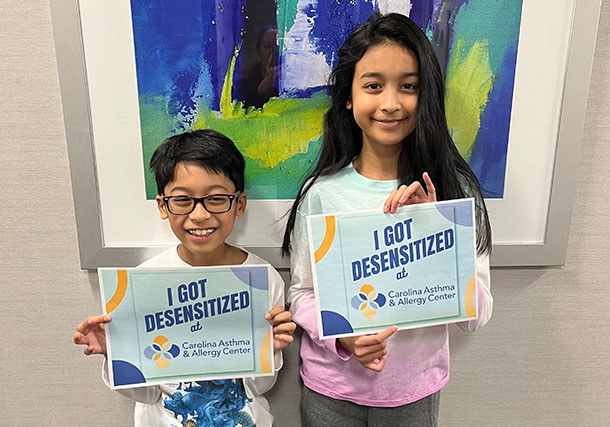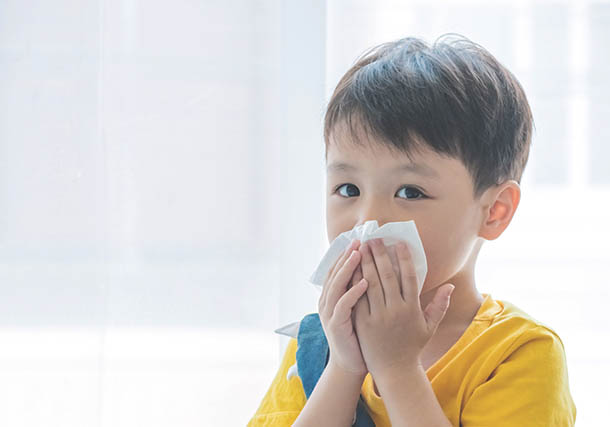
Oral Immunotherapy Treatment in Charlotte
If you’re seeking a long-term solution to manage your allergic reactions, oral immunotherapy treatment (OIT) could be the answer you’ve been looking for. At Carolina Asthma and Allergy Center, we specialize in comprehensive evaluation and treatment for allergies, including promising new treatments like oral immunotherapy. While the standard of care continues to be to avoid food allergens and carry epinephrine, new treatments aim to prevent severe reactions in the event of accidental exposures.
Allergy immunotherapy works by gradually desensitizing your immune system to specific allergens that trigger severe allergic reactions. By introducing patients to a small amount of the allergen over time, their tolerance can be built up and desensitize them to offending foods. OIT is a relatively recent treatment that’s still undergoing clinical trials, but shows promising results in reducing the severity of allergic reactions.
If you’re interested in exploring oral immunotherapy as a treatment option or considering alternative approaches to managing your allergic reactions, we encourage you to consult with our experienced allergists. Our dedicated team will assess your food allergies, evaluate your symptoms, and provide a thorough examination to determine if oral immunotherapy is a suitable treatment option for you.
Take control of your food allergies with oral immunotherapy and experience long-term relief and an improved quality of life. Contact us today to schedule a consultation and discover how oral immunotherapy can help you effectively manage your food allergies. Our team is here to guide you towards a healthier and more comfortable future.
How to Request an Appointment
Booking an appointment is hassle-free. You can simply reach out to our office by phone or complete the online appointment request form on our website. Our friendly and accommodating staff will collaborate with you to find a date and time that suits your schedule perfectly.
During your scheduled appointment, our skilled allergists will conduct a comprehensive evaluation of your medical history and perform a thorough physical examination. If needed to accurately diagnose the presence of any allergies, we will customize a range of tests for you.
Based on the results of your evaluation and tests, our experienced team will create a personalized treatment plan designed to effectively manage your food allergy symptoms and prevent future allergic reactions. As part of this plan, our experts may recommend oral immunotherapy treatment. OIT aims to desensitize your immune system to certain allergens over time and lessen your reactions to exposure.
Take the important step toward understanding and effectively managing your food allergies by contacting us today to request an appointment. Our dedicated team is committed to supporting you on your journey to a healthier and more comfortable life.
How Effective is OIT?
Oral immunotherapy, also called OIT, is quite new. While there is no cure for food allergies, OIT is aimed at reducing the risk of severe allergic reactions with accidental exposures.
OIT achieves this goal by slowly introducing amounts of the allergen into the patient’s body. Over time, the patient will receive increasing doses, which builds up tolerance. Ultimately, this may reduce the severity of allergic reactions.
During the process, immunotherapy slowly retrains your immune system to tolerate the known allergens so that your allergic reactions become much less severe. This doesn’t cure allergies, but it offers significant relief from symptoms. The goal of the treatment is to slowly adjust how the immune system reacts to those allergens, which in turn lessens allergy symptom severity.
OIT has proven effective in clinical trials, though results differ according to the food allergen. Recent studies have shown that peanut, egg and milk OIT have boosted tolerance in about 60-80% of patients. While this success rate is promising, it’s not clear whether other food allergens show similar results. Published studies have ranged considerably in efficacy, varying from 30%-90%.
In addition, the effectiveness of OIT over time is the subject of further study. It’s unclear how long tolerance lasts and whether accidental exposure to food allergens later in life can still be life-threatening.

Oral Immunotherapy Treatment: What to Expect
When considering OIT, it’s important to understand the process and what to expect. Here is a step-by-step guide to help you navigate your oral immunotherapy journey:
Consultation and Allergy Testing
The first step is to schedule a consultation with your allergist. During this appointment, your allergist will discuss the source of your allergic reactions and may conduct food allergy testing using a skin or blood examination to identify the specific food allergens causing your symptoms. This information will guide the formulation of your personalized treatment plan.
Treatment Plan and Administration
If you decide to proceed with OIT, your allergist will develop a tailored treatment plan for you. Remember that OIT should be performed under the medical supervision of a board-certified allergist. The treatment must be highly controlled in order to reduce the risk of a severe allergic reaction. To get started, you’ll receive a tiny amount of the allergen in the office. For example, if you have a peanut allergy, you’ll be given a dose of micro-dosed peanut powder.
Build-up Phase
The initial phase of OIT is known as the build-up phase. At home, you’ll take a daily dose of the allergen, and every two weeks, the dose will increase under your allergist’s supervision. Each time, you’ll also be required to stay for a period of observation. Your allergist will determine the duration of the build-up phase based on factors such as your response to the treatment and the prescribed allergen dosage.
Long-Term Treatment and Benefits
OIT is a long-term commitment aimed at providing lasting relief from exposure to your allergens. The duration of the treatment varies from person to person, with the entire build-up phase typically lasting around 9 to 12 months, with updoses every one to two weeks. It’s important to follow your allergist’s instructions and attend regular follow-up appointments to track your progress.
You must continue to follow allergy precautions such as carrying epinephrine autoinjectors and reading food labels. However, in highly successful cases, OIT patients may be able to consume small amounts of the allergen in their diet without any adverse reaction.
By undergoing OIT, you can experience a reduction in the severity of your allergic reactions, leading to an improved quality of life. If you’re ready to take control of your food allergies, schedule a consultation with our experienced allergists today. They will guide you through the process, answer any questions you may have, and provide personalized care to help you manage your food allergies effectively.
Side Effects & Risks of OIT
Those receiving OIT may have an allergic reaction to the treatment or from accidental food exposure. This is why it’s important to remain under the watchful eye of our team. Side effects may include:
- Anaphylaxis, which can be life-threatening – in this case, patients will be administered epinephrine and provided urgent medical attention
- Eosinophilic esophagitis, which may cause difficulty swallowing, sensation of food sticking in the chest, vomiting and abdominal pain
- Gastrointestinal symptoms, including abdominal pain, vomiting and cramping
- A rash, hives or throat itchiness
According to recent studies, negative side effects are fairly common in OIT patients. In a recent clinical trial, 95% of patients experienced adverse side effects, including about 50% with gastrointestinal symptoms and 14% who needed to use epinephrine.
Oral Immunotherapy vs. Avoidance
There’s no “one size fits all” treatment for patients with food allergies. While some patients may benefit from OIT, others may prefer the traditional avoidance method. Your decision may also be determined by what food allergy you have and the severity of your reactions.
Those with severe allergies may benefit from OIT therapy, as it can build tolerance and help families be less anxious about life-threatening allergic reactions.
However, OIT is also a big commitment that involves both daily doses and appointments every two weeks to increase dosage. OIT typically takes a year to see results, so this type of care plan can be quite disruptive and requires taking time off from school or work.
Avoidance is a tried-and-true method for those with food allergies. Essentially, you work to avoid the allergen, carry an epinephrine autoinjector to stop any severe reaction and seek medical attention as needed.
While the avoidance method doesn’t have the benefit of improving tolerance, it’s doesn’t require a daily commitment or put you at risk of side effects.
Choosing between OIT and avoidance is a personal decision that should be made with the specialized opinion of your allergist. Some families may stick to avoidance so their child doesn’t face disruptions at school, while others may decide on OIT in order to try building allergen tolerance.
Summary
Carolina Asthma & Allergy Center is the area’s largest asthma and allergy practice that’s made up entirely of board-certified physicians, certified in Allergy & Immunology. We currently offer the cutting-edge treatment of OIT in limited cases. We believe OIT is the future for severely allergic kids and adults, who could most benefit from increasing their allergen tolerance.
If you would like to learn more about how oral immunotherapy can help relieve your allergic reactions, please make an appointment with one of our board-certified allergists to see if this treatment is right for you. This is your first step to leading a full life without worrying about your food allergies!
OIT FAQs
How much does oral immunotherapy cost?
Oral immunotherapy costs can vary greatly. Because it involves daily doses and allergist appointments every two weeks, it’s more expensive than the traditional avoidance method. We always recommend checking with your insurance carrier to ensure the accurate cost.
What age can you start oral immunotherapy?
Early results with young children and oral immunotherapy are promising. We currently start oral immunotherapy at four years of age up to fifteen years old.
Is oral immunotherapy a cure for food allergies?
Oral immunotherapy is not a cure for food allergies. Instead, it works to build tolerance so that there’s less likelihood of a life-threatening reaction. If OIT is successful, it can lead to less severe reactions and reduced anxiety about food allergies.



